[Dec 2007, Volume 4 Quarterly Issue] Pdf File size - The IIPM Think ...
[Dec 2007, Volume 4 Quarterly Issue] Pdf File size - The IIPM Think ...
[Dec 2007, Volume 4 Quarterly Issue] Pdf File size - The IIPM Think ...
You also want an ePaper? Increase the reach of your titles
YUMPU automatically turns print PDFs into web optimized ePapers that Google loves.
MORE MARKETS, LESS GOVERNMENT<br />
equity”, the interdependence between<br />
agriculture and industry and the dilemma<br />
between the need for widening the<br />
market and the prevention of the abuse<br />
of monopoly power.<br />
Especially with regard to the abuse of<br />
monopoly power, let us also for example<br />
and for a moment keep in view economists<br />
and others who act like petty salesmen<br />
for the Commerce Ministry concept<br />
of SEZs. <strong>The</strong>se economists, both within<br />
state institutions and belonging to dubious<br />
NGOs, who on the one hand are the<br />
loudest ones to run the State down while<br />
singing the paens of the market, are the<br />
same ones on the other hand who are encouraging<br />
the worst abuses of monopoly<br />
power and the dismantling of the constitutional<br />
state in the name of SEZs. <strong>The</strong>re<br />
can be no greater irony than this. SEZs<br />
are best described as state encouraged<br />
rapacity by market players who cannot<br />
function in a market more even handedly<br />
regulated by the state and by a state<br />
that stands by the Indian Constitution<br />
and its protections for the rights of all<br />
citizens, be they poor peasants or workers.<br />
Those professing an almost evangelistic<br />
deal to have “growth at any cost”<br />
are oblivious to the principle that any<br />
abuse of monopoly power by the state in<br />
the name of the market, is a sure recipe<br />
that can take any nation however great it<br />
may be, including India, down a vortex of<br />
social instability and violence. This is the<br />
reality that is stares before us not only in<br />
the aftermath of Nandigram but in places<br />
like Mangalore, where fraud and deception<br />
is sought to used to divest people<br />
of productive agricultural land and create<br />
social tension and conflict. Finance<br />
Minister Chidambaram’s note of caution<br />
at the recent Indian Economic Forum<br />
that growth cannot be only for the top<br />
ten percent is not only a welcome note of<br />
caution but also an indication that<br />
policy making at the highest level is<br />
recognizing the larger objectives of<br />
economic growth.<br />
Such caution seems absent at the Commerce<br />
Ministry and most statements that<br />
emanate from the Commerce Ministry,<br />
including that of the Commerce Secretary<br />
seems not only totally oblivious to<br />
ground realities but a very unbalanced<br />
approach to economic growth priorities.<br />
While it is a matter of very deep concern<br />
as regards the long term implications for<br />
India of the SEZ route to rapid economic<br />
growth, the fact is that the disastrous<br />
nature of its implementation could actually<br />
bring down the government and the<br />
Congress Party to which belongs Mr.<br />
Kamal Nath the Commerce Minister<br />
whose Ministry seems to be recklessly<br />
spearheading the SEZ concept. Though<br />
all this may not happen before huge economic<br />
and social costs have accrued to<br />
the nation in terms of not only the accentuated<br />
conflicts it is going to engender<br />
but also in terms of the loss of revenues<br />
in terms of the state and loss of income<br />
and livelihood for thousands of people.<br />
In a globalised world where sovereignty<br />
is also at stake, the Commerce Ministry<br />
can try to run rough shod over all other<br />
Ministries including the Finance Ministry.<br />
However, what such deepening fissures<br />
in economic governance shows is<br />
the possibilities that exist for sections of<br />
the market to use one instrumentality of<br />
state, in this case the Commerce Ministry,<br />
to undermine the state as a whole<br />
and thereby society, showing the hollowness<br />
of arguments pitting market versus<br />
the state. In the end the greed and rapacity<br />
of the market can take both state and<br />
market together down.<br />
<strong>The</strong> challenge for the academic as well<br />
as working economist, for any person<br />
concerned about and engaged with public<br />
policy, is how even in these circumstances<br />
to focus on long term issues for<br />
the country as a whole. In the Indian<br />
context, what seems in my mind and<br />
echoing Sukhamoy Chakravarty, a key<br />
issue that is of great relevance for the immediate<br />
and the long term, is “a proper<br />
formulation of the role of knowledge as<br />
A key issue that is of great relevance for the immediate<br />
and the long term is “a proper formulation of the role of<br />
knowledge as a productive factor” and “institutional arrangements<br />
necessary for transition to a ‘learning society’<br />
a productive factor” and “institutional<br />
arrangements necessary for transition to<br />
a ‘learning society’ ".<br />
Knowledge And <strong>The</strong> Learning<br />
Society<br />
Chakravarty refers to Simon Kuznets<br />
who was of the conclusion that in the final<br />
analysis, it was the growth of knowledge<br />
which was the most decisive characteristic<br />
of modern economic growth.<br />
Here Kuznets was not referring to technology<br />
alone but as Chakravarty puts it,<br />
“also of basic sciences which are increasingly<br />
having profound impacts on transformations<br />
in the sphere of production<br />
that are leading to changes in the international<br />
economy”. He warns us that a<br />
THE INDIA ECONOMY REVIEW<br />
19


![[Dec 2007, Volume 4 Quarterly Issue] Pdf File size - The IIPM Think ...](https://img.yumpu.com/29766298/18/500x640/dec-2007-volume-4-quarterly-issue-pdf-file-size-the-iipm-think-.jpg)
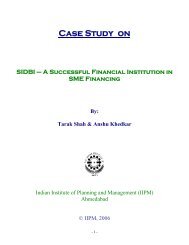
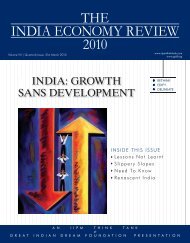
![[Feb 2008, Volume V Annual Issue] Pdf File size - The IIPM Think Tank](https://img.yumpu.com/43961117/1/190x245/feb-2008-volume-v-annual-issue-pdf-file-size-the-iipm-think-tank.jpg?quality=85)
![[June 2008, Volume V Quarterly Issue] Pdf File size - The IIPM Think ...](https://img.yumpu.com/41693247/1/190x245/june-2008-volume-v-quarterly-issue-pdf-file-size-the-iipm-think-.jpg?quality=85)
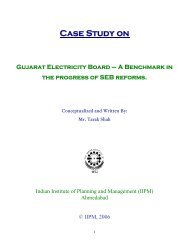
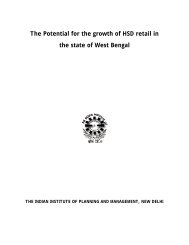
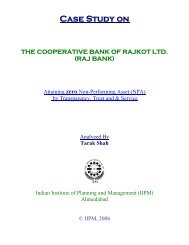

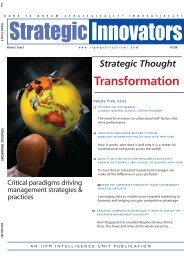
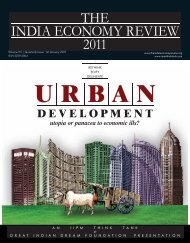
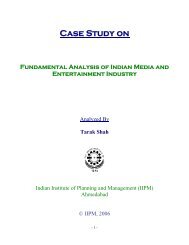
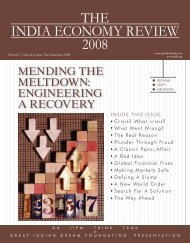
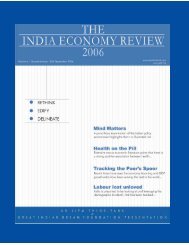
![[Volume VI | Quarterly Issue: 31st May 2009] Pdf File size](https://img.yumpu.com/27796051/1/190x245/volume-vi-quarterly-issue-31st-may-2009-pdf-file-size.jpg?quality=85)